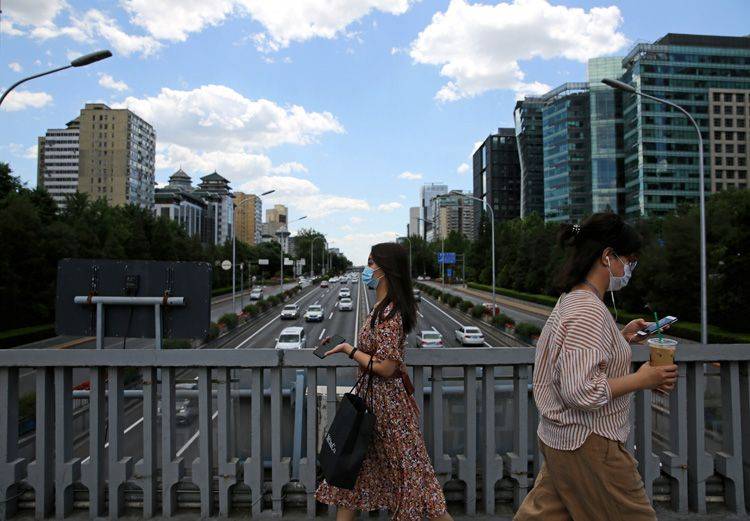Beijingwalker
Elite Member
- Nov 4, 2011
- 76,551
- 104,138
- Country of Origin

- Country of Residence

Chinese people are living two years longer thanks to ‘war on pollution,’ while air pollution gets worse in South Asia: report
CNNPublished 1:24 AM EDT, Wed August 30, 2023

Blue skies over a park in Beijing on April 25, 2023.
Ten years ago, China’s capital was often covered in dense yellow and gray smog, so thick it shrouded nearly everything from view.
People locked their windows, donned face masks and cranked air purifiers on high to escape what became known as Beijing’s “air-pocalypse.”
The air quality was so bad, and became so globally infamous, that Chinese leaders launched a multibillion-dollar “war against pollution.”
A decade on, those efforts are paying dividends. China’s pollution levels in 2021 had fallen 42% from 2013, according to a new report released Tuesday, making it a rare success story in the region, where pollution is getting worse in some parts, including South Asia.

A heavily polluted day in Beijing on December 22, 2015.
Greg Baker/AFP/Getty Images/File
The annual Air Quality Life Index report, produced by the Energy Policy Institute at the University of Chicago, praised China’s “staggering success in combating pollution.”
Pollution levels globally have fallen slightly from 2013 to 2021 – which the report said was “entirely due to China’s progress.” Without China’s improvements, the world’s average pollution would have risen instead.
The improvement means the average Chinese citizen’s lifespan is now 2.2 years longer, the report said.
Chinese cities used to dominate global rankings of the world’s worst air quality; while some are still on those lists, in many cases they have been overtaken by cities in South Asia and the Middle East.
In 2021, Beijing recorded its best monthly air quality since records began in 2013. “The ‘Beijing blue’ has gradually become our new normal,” said the country’s environment minister at the time, according to state media.
But, the report warned, there is still work to do as China remains the world’s 13th most polluted country. And Beijing’s particulate pollution – the tiny but highly dangerous pollutants that can evade the human body’s usual defenses – is still 40% higher than in the most polluted county in the United States.
While China’s particulate pollution levels are within its national standards, they “significantly exceed” the World Health Organization’s (WHO) guidelines, the report said.
However, the progress made in China shows that change is possible, if the government and its people are willing and able to put in the work.
For instance, the report said, since 2014 the Chinese government has limited the number of cars on roads in major cities; banned new coal plants from the most-polluted areas; cut emissions or closed existing plants; and reduced high-polluting industrial activity such as the manufacturing of iron and steel.
“At the foundation of those actions were common elements: political will and resources, both human and financial, that reinforced each other,” the report said. “When the public and policymakers have these tools, action becomes much more likely.”
Deadly air in South Asia
In some other places, the situation has become worse.South Asia is now the “global pollution epicenter,” home to the four most polluted countries – Bangladesh, India, Nepal and Pakistan – which collectively make up nearly a quarter of the world’s population, the report said.
In each of these countries, the average resident is losing five years of their lifespan to pollution, it added. That toll is even higher in the most polluted regions.
Whereas air pollution has steadily decreased in China over the years, it has increased in South Asia to the point where it has a greater effect on life expectancy than tobacco use or unsafe water.
In India the risk is especially high, in part due to its population density and the sheer amount of people living in highly polluted urban areas. In 2021, India’s particulate pollution was more than 10 times WHO guidelines, the report said.
There are various factors at play, it said; these countries have seen explosive population growth, economic development and industrialization over the past 20 years. Energy demand and fossil fuel use have skyrocketed accordingly; in Bangladesh, the number of cars on the road tripled from 2010 to 2020.
Other practices like crop burning, which many farmers use to clear their fields for harvest, and the use of brick kilns have also contributed to rising pollution.
The governments in these regions have begun forming initiatives and policies to cut back on pollution, but may face a tougher task due to the difference in economic strength and infrastructure, the report said.
“The countries experiencing some of the worst pollution today don’t have the tools they need to fill these basic air quality management holes,” such as establishing reliable and publicly accessible air quality data, the report said.
Africa, another hotspot for pollution, faces similar difficulties. While there are large global funds to help African countries fight health risks like HIV/AIDS, malaria and tuberculosis, there is nothing similar dedicated to fighting pollution.
Aid from international organizations and private donors could go a long way in building the infrastructure needed, the report added, but “right now, that’s not happening,” it said.
https://edition.cnn.com/2023/08/30/...port-china-south-asia-intl-hnk-scn/index.html


















